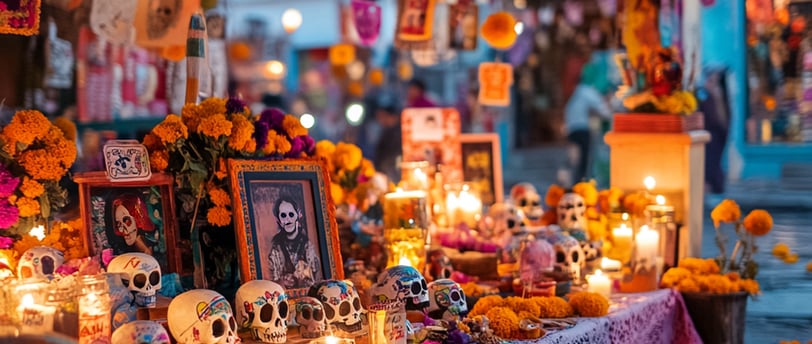Día de los Muertos in Mexico: A Unique Celebration of Life and Memory
Discover the meaning behind Día de los Muertos, Mexico’s vibrant celebration of life and memory. Learn about its cultural significance, traditions, and how learning Spanish with Idiomas365 can help you connect more deeply with Mexican culture.
SPANISH
Idiomas365
11/1/20243 min leer


Día de los Muertos, or Day of the Dead, is one of Mexico’s most celebrated traditions, reflecting the nation's deep-rooted connection with family, history, and honoring the departed. This iconic holiday, observed on November 1st and 2nd, is much more than a day to mourn; it’s a celebration of life, a moment to connect with the past, and a meaningful experience for those who want to understand Mexican culture. Let’s dive into what Día de los Muertos is all about, why it’s culturally significant, and why learning Spanish can enhance your understanding of this beautiful tradition.
What Is Día de los Muertos?
Día de los Muertos is a Mexican holiday that commemorates loved ones who have passed away. While it coincides with Halloween, it’s not meant to be spooky or scary. Instead, it’s a joyful, vibrant celebration where families welcome the spirits of the deceased back to the world of the living. This tradition has roots in indigenous Aztec beliefs and has blended with Spanish customs over centuries, creating a unique fusion that symbolizes both life and death as interconnected parts of existence.
Traditions and Symbols of Día de los Muertos
1. Ofrendas (Altars): Families set up altars in their homes with photos, candles, and mementos. These altars, known as ofrendas, are filled with items that the deceased loved in life, such as favorite foods, drinks, and personal belongings. This gesture invites spirits back to enjoy these offerings during the celebration.
2. Cempasúchil (Marigold Flowers): Known as the “flower of the dead,” marigolds are believed to attract spirits back to the world of the living with their vibrant color and strong scent. They are often arranged on altars and paths to guide the spirits to the ofrenda.
3. Calaveras (Sugar Skulls): These colorful sugar skulls represent death in a playful way, reminding us that death is not the end but a continuation. Families decorate sugar skulls with the names of deceased loved ones and place them on the altar.
4. Pan de Muerto (Bread of the Dead): A sweet bread shaped with crossbones on top, pan de muerto is an essential part of Día de los Muertos. Each family has its own tradition for making and decorating it, and it is often shared with friends and family.
Why Is Día de los Muertos Important in Mexican Culture?
Día de los Muertos holds a unique cultural significance as it represents a deep respect for ancestry and tradition. This holiday provides an opportunity for people to reflect on the cycle of life and death, reminding everyone to cherish each moment and honor loved ones. Unlike many cultures that view death with fear or sadness, Mexicans embrace it with warmth, laughter, and celebration. The holiday bridges the gap between past and present, helping families feel connected to those who came before them.
For visitors and language learners, Día de los Muertos offers a glimpse into Mexican culture’s core values: love, family, respect, and a strong bond with ancestors. Understanding these elements is essential for anyone interested in learning Spanish, as the language is deeply connected to these cultural expressions.
Learn Spanish to Connect with Mexican Traditions
To fully appreciate Día de los Muertos and other Mexican traditions, learning Spanish is invaluable. By understanding the language, you’ll gain a deeper connection to the culture, communicate meaningfully with locals, and immerse yourself in authentic experiences. Idiomas365 invites you to explore the richness of the Spanish language, where each word and phrase helps you unlock stories, traditions, and cultural nuances that make Mexico unique.
Día de los Muertos is not just a celebration; it’s a cultural treasure that reflects the spirit of Mexico and its enduring values. This holiday teaches us to celebrate life, honor our past, and keep memories alive. Whether you’re learning Spanish to better understand Mexico or exploring new cultures, Día de los Muertos is a tradition worth experiencing.
So why not start your Spanish journey with Idiomas365 today? Dive into the language and culture of Mexico, where each word opens a door to history, tradition, and unforgettable experiences.
